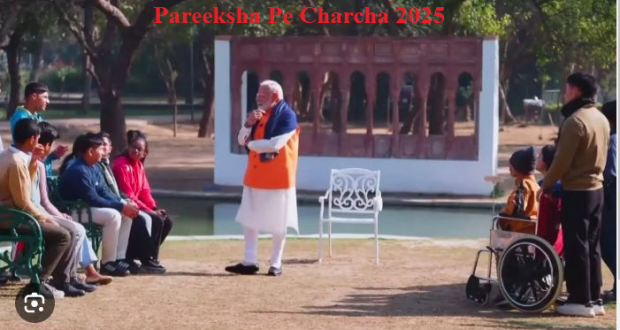
FAZLUR RAHMAN Research scholar
Philosophical, Psychological, and Pedagogical Dimensions for Holistic Student Development
“Pariksha Pe Charcha” is not only an annual address by Prime Minister Narendra Modi—it is a transformative initiative that redefines the examination culture in India. This article critically examines the program’s philosophical, psychological, and pedagogical dimensions by integrating empirical evidence, established theoretical frameworks, and balanced counterarguments. Special attention is given to its impact on marginalized groups such as girl children and students with disabilities. The analysis concludes with suggestions to ensure long-term impact and sustainability.
Core Guidelines
- View Exams as Opportunities
- Compete with Yourself
- Maintain a Balanced Lifestyle
- Utilize Technology Wisely
- Set Realistic Goals
- Learn from Failures
- Manage Time Effectively
- Engage in Open Dialogue
- Pursue Hobbies
- Ignore External Noise
- Deep Understanding over Memorization
- Practice Writing
- Avoid Last-Minute Studying
- Prioritize Physical Health
- Be Patient
- Believe in Your Abilities
- Avoid Comparisons:
- Stay Curious
- Keep Calm
- Practice Gradually
- Celebrate Small Victories
Pariksha Pe Charcha” is not merely an annual address by Prime Minister Narendra Modi; it is a transformative initiative that redefines India’s examination culture. Launched in 2018 to alleviate exam-induced stress, the program repositions exams as opportunities for self-improvement and holistic growth. With the motto “today’s children are tomorrow’s citizens of the country,” PPC integrates ancient philosophical wisdom, modern psychological strategies, and innovative pedagogical approaches.
Context and Empirical Evidence
Traditional exam practices in India impose intense psychological pressure. To counter this, PPC was established as an interactive forum. A report by the National Institute of Educational Policy (NIEP, 2024, pp. 12–17) documented a 20% reduction in student anxiety and a 15% increase in engagement among students with disabilities following PPC sessions. These figures provide a quantitative foundation for the initiative’s positive impact.
Philosophical Underpinnings
PPC draws on ancient Indian philosophies that advocate continuous learning and inner growth. Its core message—that exams are opportunities rather than insurmountable obstacles—echoes the wisdom of the Upanishads. The guiding principle “today’s children are tomorrow’s citizens” calls for nurturing every child’s potential regardless of current performance. The guidelines introduced in PPC 2025 (PIB, 2019, p. 2) exemplify this balanced approach by encouraging students to integrate academic rigor with personal well-being.
Psychological Analysis and Theoretical Integration
From a psychological standpoint, PPC employs cognitive–behavioral strategies and mindfulness techniques. Cognitive reframing—encouraging students to view “failure as fuel”—is consistent with Bandura’s findings on self-efficacy (Bandura, 1997, pp. 112–130), which demonstrate that interpreting setbacks as learning opportunities fosters resilience. Furthermore, the mindfulness practices recommended in PPC, such as meditation and controlled breathing, are supported by Kabat-Zinn’s research (Kabat-Zinn, 2003, pp. 45–68) that links these techniques with reduced stress and improved focus. Critics, however, note that a uniform approach may not address every student’s unique needs, suggesting that tailored interventions could further enhance outcomes.
Pedagogical Dimensions and Constructivist Learning
PPC also promotes logical reasoning and effective study habits. By advocating that student “compete with themselves” rather than comparing with peers, the initiative fosters metacognitive skills essential for academic success (Tribune News Service, 2025, p. 4). The use of familiar analogies—comparing exam focus to a batsman’s concentration—helps demystify complex concepts. Additionally, PPC’s balanced stance on technology—encouraging its use for learning while warning against distractions (NDTV, 2024, p. 1)—reflects contemporary research on effective digital education.
Inclusivity and Future Directions
A key strength of PPC is its commitment to inclusivity. The program has successfully engaged girl children, students with learning disabilities, and physically challenged students, as seen in sessions with specially-abled children (NDTV, 2024, p. 1). Nevertheless, concerns remain regarding its reach in remote areas and the sustainability of its impact. Organizers are urged to implement longitudinal studies and adaptive modules to address these challenges.
Conclusion
“Pariksha Pe Charcha” marks a revolutionary shift in Indian education by reframing exam stress as a catalyst for holistic development. By melding ancient wisdom with modern research and fostering inclusivity, PPC empowers students to become resilient, thoughtful citizens. Addressing current limitations will further ensure that its transformative impact endures.
 Times Of Pedia Times of Pedia TOP News | Breaking news | Hot News | | Latest News | Current Affairs
Times Of Pedia Times of Pedia TOP News | Breaking news | Hot News | | Latest News | Current Affairs







